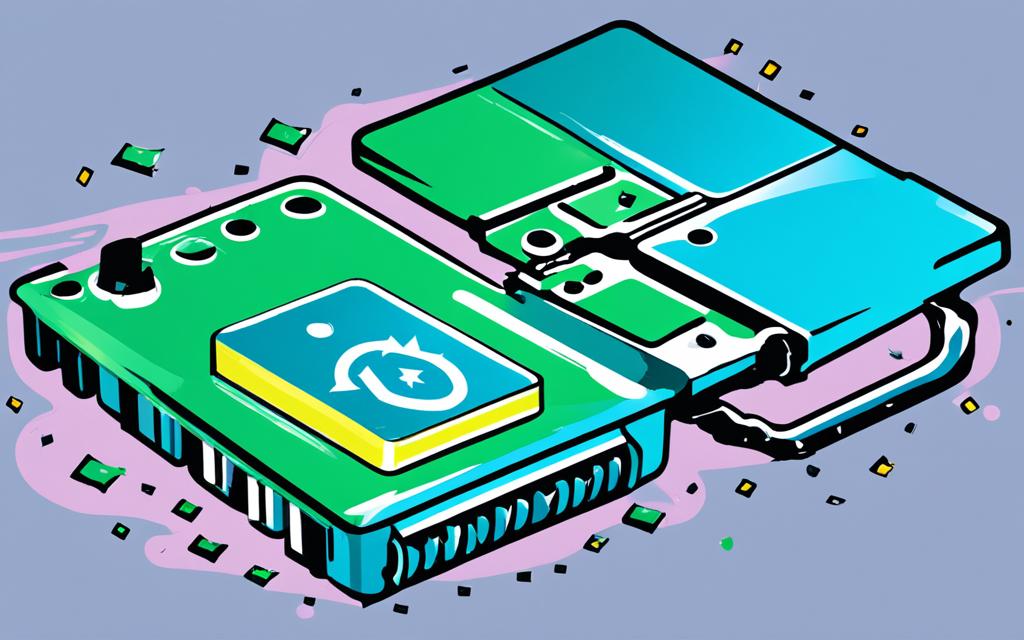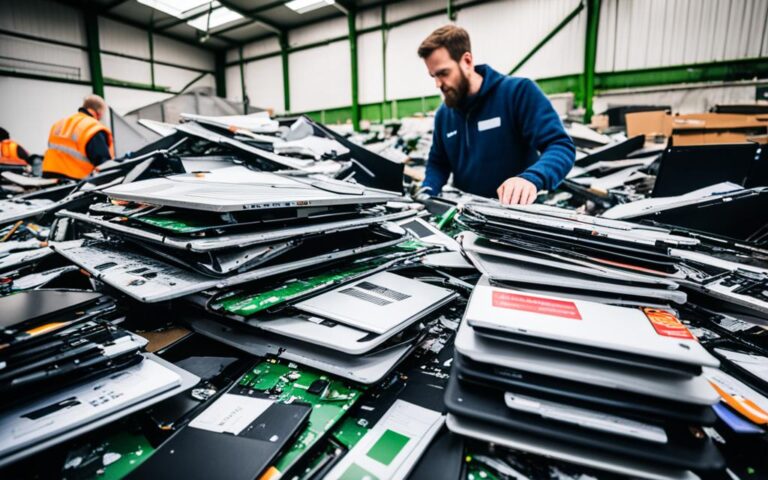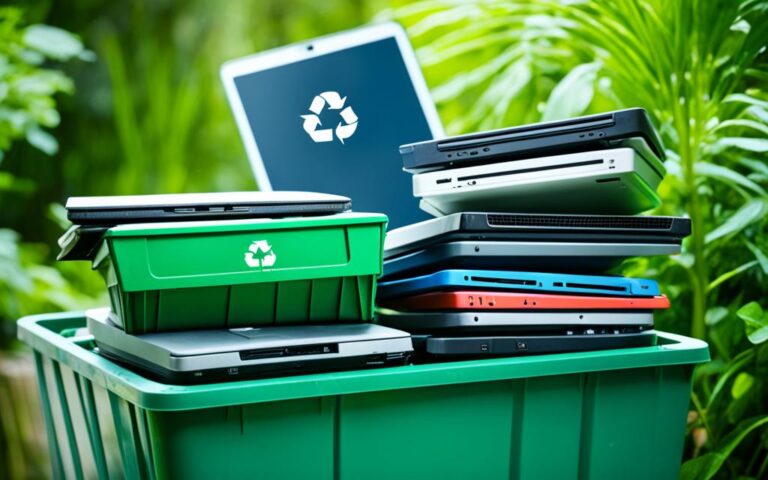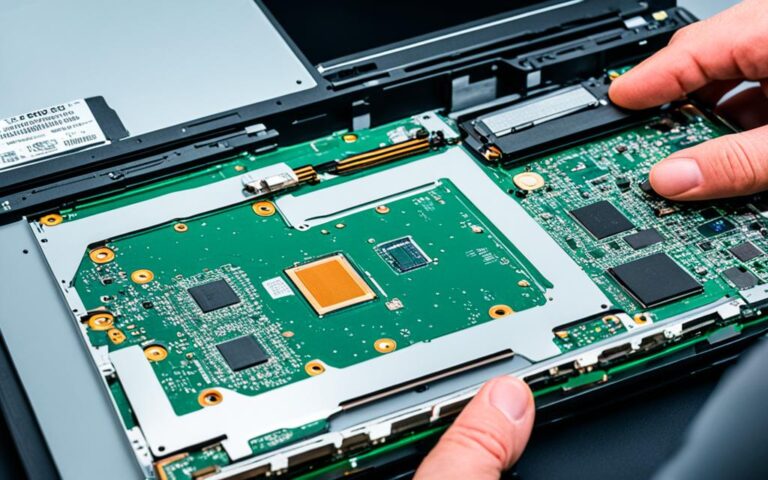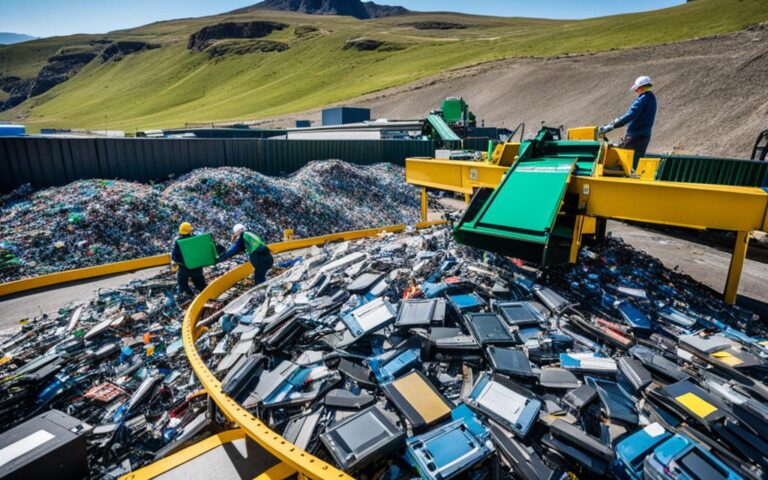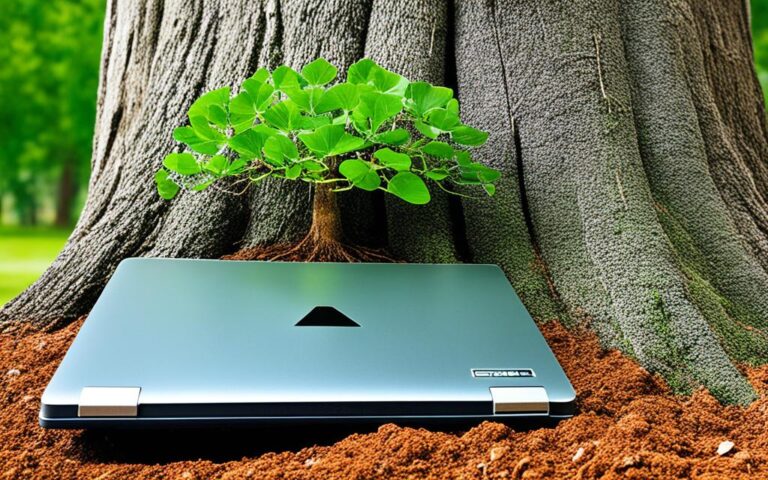The Challenges and Solutions in Laptop Battery Recycling
Laptop battery recycling presents a range of challenges due to their composition and potential environmental impact. As essential components of portable electronic devices, laptop batteries have a limited lifespan and require proper disposal to avoid harmful effects on the environment. However, innovative solutions are emerging to address these challenges and promote sustainable practices in laptop battery recycling.
With the increasing use of portable electronic devices, the disposal of laptop batteries has become a pressing concern. The improper disposal of these batteries can have significant environmental consequences, including the contamination of soil, water, and air. Laptop batteries contain toxic materials such as lead, lithium, cobalt, and nickel, which, if not handled correctly, can pose a threat to the ecosystem.
The current methods of laptop battery recycling face several challenges that hinder their efficiency. One of the primary challenges is the lack of standardized procedures and regulations for recycling lithium-ion batteries. This results in inconsistency and inefficiency in the recycling process. Additionally, the varying composition of laptop batteries makes it difficult to extract and recover valuable materials.
Despite these challenges, there is hope on the horizon. Innovative solutions are being developed to improve the efficiency and effectiveness of laptop battery recycling. Companies are investing in advanced technologies to extract valuable materials from laptop batteries more efficiently. Furthermore, initiatives are underway to create a closed-loop system for battery production, where recycled materials are used to manufacture new batteries.
Government regulations play a vital role in promoting and enforcing laptop battery recycling practices. Countries around the world have implemented extended producer responsibility (EPR) programs, which hold manufacturers accountable for the entire lifecycle of their products, including recycling. Strict regulations and incentives can encourage proper disposal and recycling.
However, to make a significant impact, awareness and education about the importance of laptop battery recycling are crucial. By informing the public about the environmental impact and benefits of recycling, more individuals and businesses can actively participate in recycling efforts. Promoting awareness and education is key to achieving a sustainable future.
In conclusion, while laptop battery recycling poses challenges, innovative solutions, government regulations, and increased awareness are driving progress in this field. By working together, we can mitigate the environmental impact of laptop battery disposal and create a more sustainable future.
The Environmental Impact of Laptop Battery Disposal
Improper disposal of laptop batteries can have severe consequences for the environment. These batteries contain toxic materials such as lead, lithium, cobalt, and nickel, which can pose a significant risk if not handled correctly. When laptop batteries are not disposed of properly, these toxic materials can contaminate the soil, water, and air, endangering ecosystems and human health.
The extraction and mining of these materials used in laptop batteries also come with their own set of environmental concerns. The process of extracting minerals like lithium and cobalt involves extensive land and water usage, contributing to deforestation and water pollution. Furthermore, mining activities can disrupt ecosystems, leading to the loss of biodiversity in affected areas.
It is essential to prioritize effective and eco-friendly solutions for laptop battery disposal to mitigate these environmental impacts. By doing so, we can minimize pollution, conserve natural resources, and work towards a more sustainable future.
Image:
| Environmental Impact of Improper Laptop Battery Disposal | Adverse Effects |
|---|---|
| Soil Contamination | Poisonous substances can leach into the soil, affecting plant growth and ecosystem health. |
| Water Pollution | Contaminated batteries can release toxic substances into water bodies, endangering aquatic life and human consumption. |
| Air Pollution | Improper disposal methods, such as incineration, can release harmful chemicals into the atmosphere, contributing to air pollution. |
| Resource Depletion | Disposal without recycling leads to the loss of valuable materials, increasing the demand for new resources and perpetuating environmental degradation. |
In conclusion, the environmental impact of laptop battery disposal should not be underestimated. To ensure a sustainable future, it is crucial to raise awareness, adopt proper disposal practices, and embrace eco-friendly solutions for recycling and reusing laptop batteries.
Challenges in Current Laptop Battery Recycling Methods
The process of recycling laptop batteries presents several challenges that hinder the effective and efficient disposal of these essential components. These challenges revolve around the methods used in laptop battery recycling, creating obstacles that need to be overcome to promote sustainable practices. Let’s explore some of the key challenges faced in current laptop battery recycling methods.
Lack of Standardized Procedures and Regulations:
One significant challenge is the absence of standardized procedures and regulations for recycling lithium-ion batteries used in laptops. The lack of uniformity in recycling practices leads to inconsistency, inefficiency, and difficulty in managing the recycling process effectively. To ensure safe and environmentally friendly recycling, it is essential to establish clear guidelines and regulations that facilitate the proper handling of laptop batteries during the recycling process.
Varying Composition of Laptop Batteries:
Another challenge arises from the varying composition of laptop batteries. These batteries contain a combination of materials, including lithium, cobalt, nickel, and other valuable metals. However, the composition can differ significantly between different laptop models and brands, making it challenging to extract and recover valuable materials efficiently. Developing innovative techniques that can adapt to the diverse composition of laptop batteries is vital to optimize the recycling process.
High Cost of Recycling and Limited Infrastructure:
The high cost of recycling laptop batteries poses a significant challenge to implementing large-scale recycling programs. The complex nature of the recycling process, which involves disassembling, sorting, and extracting materials, contributes to the high cost. Additionally, limited infrastructure for recycling facilities and the transportation of laptop batteries further hinder the expansion and effectiveness of recycling efforts. Overcoming these challenges requires investment in advanced recycling technologies, infrastructure development, and collaborations between stakeholders.
Challenges in Current Laptop Battery Recycling Methods
| Challenges | Impact |
|---|---|
| Lack of standardized procedures and regulations | Causes inconsistency and inefficiency in the recycling process |
| Varying composition of laptop batteries | Makes extraction and recovery of valuable materials difficult |
| High cost of recycling and limited infrastructure | Hampers large-scale recycling programs and expansion efforts |
Addressing these challenges is crucial for the development of sustainable laptop battery recycling practices. By finding innovative solutions and implementing effective regulations, we can overcome these hurdles and create a more efficient and environmentally friendly approach to laptop battery recycling.
Innovative Solutions in Laptop Battery Recycling
Despite the challenges, innovative solutions are emerging in laptop battery recycling. These solutions focus on improving the efficiency and effectiveness of the recycling process. Companies are developing advanced technologies to extract valuable materials from laptop batteries more efficiently, ensuring that fewer resources go to waste.
One example of such innovation is the development of innovative extraction methods that allow for a higher percentage of valuable materials, such as lithium and cobalt, to be recovered from used laptop batteries. These methods utilize advanced techniques, such as hydrometallurgical and pyrometallurgical processes, to extract and purify the materials. These innovative methods not only enhance the recovery of valuable resources but also minimize environmental risks associated with traditional recycling methods.
Additionally, initiatives are being taken to create a closed-loop system for battery production. This means that instead of relying solely on mining new resources, recycled materials from laptop batteries are used to manufacture new batteries. This approach reduces the demand for virgin materials, lowers carbon emissions, and minimizes the environmental impact of battery production.
These innovative solutions in laptop battery recycling aim to reduce the environmental impact of laptop battery disposal and promote circular economy practices. By focusing on maximizing resource recovery and minimizing waste, these solutions contribute to a more sustainable and environmentally friendly approach to electronic waste management.
“The development of innovative technologies and closed-loop systems in laptop battery recycling offers a significant opportunity to reduce our reliance on scarce resources and minimize the environmental impact of electronic waste.” – Mark Johnson, Environmental Scientist
The Role of Government Regulations in Laptop Battery Recycling
Government regulations play a vital role in promoting and enforcing laptop battery recycling practices. These regulations ensure that manufacturers and consumers adhere to proper recycling procedures, mitigating the environmental impact of laptop battery disposal. Some countries have implemented extended producer responsibility (EPR) programs, where manufacturers are responsible for the entire lifecycle of their products, including recycling.
By implementing strict regulations and creating incentives for recycling, governments can encourage the proper disposal and recycling of laptop batteries. These regulations provide a framework for sustainable practices and hold businesses accountable for their environmental impact.
Table: Government Regulations and Laptop Battery Recycling
| Country | Regulations | Incentives |
|---|---|---|
| United Kingdom | The Waste Electrical and Electronic Equipment (WEEE) Regulations | EPR programs and financial support |
| United States | The Resource Conservation and Recovery Act (RCRA) | Tax credits and grants for recycling initiatives |
| Germany | The Battery Act | Financial penalties for non-compliance and recycling quotas |
These regulations not only establish guidelines for proper disposal and recycling but also promote innovation in laptop battery recycling methods. By requiring manufacturers to take responsibility for the entire lifecycle of their products, including recycling, governments incentivize the development of more efficient and sustainable recycling technologies.
“Government regulations provide a foundation for sustainable laptop battery recycling practices, ensuring that both manufacturers and consumers contribute to reducing the environmental impact of battery disposal.”
Additionally, government regulations contribute to raising public awareness about the importance of laptop battery recycling. Public campaigns and educational initiatives supported by government entities help inform individuals about the environmental consequences of improper disposal and the benefits of recycling.
By establishing clear regulations and actively supporting laptop battery recycling initiatives, governments play a pivotal role in creating a more sustainable future.
Promoting Awareness and Education on Laptop Battery Recycling
Promoting awareness and education about the importance of laptop battery recycling is crucial in encouraging individuals and businesses to adopt sustainable practices. By increasing awareness, more people can actively participate in laptop battery recycling efforts, minimizing the environmental impact of improper disposal.
The Power of Awareness Campaigns
Awareness campaigns play a pivotal role in educating the public about the environmental consequences of improper laptop battery disposal. By highlighting the potential harm caused by toxic materials such as lead, lithium, cobalt, and nickel, these campaigns bring attention to the urgent need for proper recycling.
Through compelling messaging and captivating visuals, awareness campaigns can effectively convey the message that laptop battery recycling is not only a responsible choice but also an opportunity to contribute to a greener future. By reaching a wide audience through various media channels, these campaigns promote consciousness and drive positive change.
“Laptop battery recycling is not just about responsibly discarding old batteries; it’s about preserving our planet for future generations.” – GreenTech Magazine
The Role of Educational Programs
Education plays a vital role in equipping individuals with the knowledge and resources needed to recycle laptop batteries effectively. Educational programs can provide comprehensive information on the proper disposal and recycling methods, ensuring that people understand the value of recycling and the potential harm caused by improper disposal.
These programs can offer practical guidance, such as step-by-step instructions for safely removing laptop batteries and directing individuals to authorized recycling centers. By emphasizing the importance of recycling and demystifying the process, educational programs empower people to take action and make informed choices.
Creating a Recycling Culture
To foster a sustainable future, it is essential to create a culture of laptop battery recycling. Emphasizing the benefits of recycling, including resource conservation and pollution reduction, can inspire individuals and businesses to participate actively in recycling initiatives.
Collaborative efforts between public and private sectors are instrumental in promoting recycling as a collective responsibility. By partnering with educational institutions, businesses, and community organizations, governments can facilitate educational workshops, awareness events, and innovative recycling initiatives.
Image related to laptop battery recycling:
| Benefits of Promoting Awareness and Education | Actions |
|---|---|
| Informed choices | Encourage individuals to make responsible decisions by providing them with valuable information about the environmental impact of improper disposal. |
| Increased participation | By raising awareness and providing educational resources, more individuals and businesses will actively engage in laptop battery recycling efforts. |
| Long-term sustainability | By instilling a recycling culture through awareness and education, laptop battery recycling can become an integral part of sustainable practices. |
In conclusion, awareness and education are essential in promoting laptop battery recycling. Through impactful awareness campaigns, educational programs, and collaborative efforts, we can cultivate a culture that values the proper disposal and recycling of laptop batteries. By empowering individuals and businesses with the knowledge and resources needed, we can protect the environment and create a greener future for generations to come.
Conclusion
Laptop battery recycling is a complex process that presents various challenges. However, there is hope for a more sustainable future through innovative solutions and government regulations.
By promoting awareness and educating individuals about the environmental impact of improper disposal, we can encourage responsible recycling practices.
Furthermore, implementing proper recycling methods and developing advanced technologies will enable us to extract valuable materials from laptop batteries more efficiently. This not only reduces the environmental impact of disposal but also conserves valuable resources.
It is crucial for individuals, manufacturers, and governments to collaborate and find effective laptop battery recycling solutions. By working together, we can create a more sustainable future and protect our environment for generations to come.
FAQ
What are laptop batteries made of?
Laptop batteries are typically made of materials such as lithium, lead, cobalt, and nickel.
Why is it important to recycle laptop batteries?
It is crucial to recycle laptop batteries because improper disposal can have significant environmental consequences due to the toxic materials they contain.
What are the environmental consequences of improper laptop battery disposal?
Improper disposal of laptop batteries can lead to soil, water, and air contamination, as well as adverse effects from the extraction and mining of battery materials.
What challenges are faced in current laptop battery recycling methods?
The challenges in current laptop battery recycling methods include a lack of standardized procedures, difficulty in extracting valuable materials, high costs, and limited infrastructure.
Are there any innovative solutions for laptop battery recycling?
Yes, innovative solutions are emerging in laptop battery recycling, including advanced technologies for efficient material extraction and closed-loop systems for battery production.
What is the role of government regulations in laptop battery recycling?
Government regulations play a vital role in promoting and enforcing laptop battery recycling practices, ensuring manufacturers and consumers adhere to proper recycling procedures.
How can awareness and education contribute to laptop battery recycling?
Promoting awareness and education about laptop battery recycling can encourage individuals and businesses to adopt sustainable practices and actively participate in recycling efforts.

